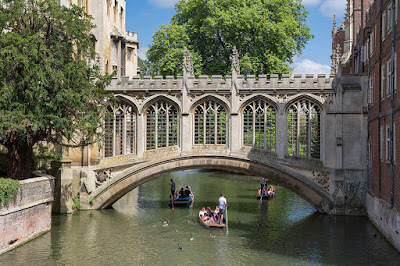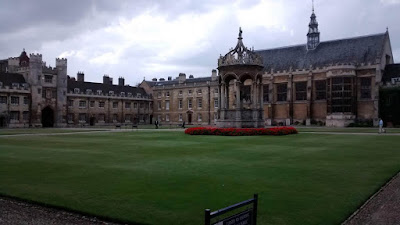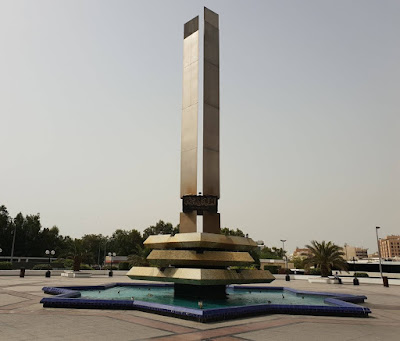I first spotted them on my way to Darling Harbour.
Bullets. Four of them, seven metres high, imposing in absolute rigidity. Full metal jackets. A sculpture that didn't toy around with ambiguity; it was clear what the bullets implied. They exuded a plaintive sentience which, while inescapable, was only a part of the full message.
At their feet, lying in haunting finality of the aftermath, were three bullet shells.
The shells lay scattered at the base of the sculpture, eternally evocative of the horrors of war and the absoluteness of death. An indigenous tribute to the sacrifices of the Aboriginals of Australia, the Yininmadyemi Memorial is placed on a pathway shaped like a boomerang. It is shaped so to symbolise the boomerangs handed to departing soldiers by their families. Much like the ANZAC Memorial that stood a few hundred yards away, it asked you to question the significance of our debates in the light of its consequences.
It is hard to argue politics or religion when the rich wage war and the poor die.
Does the prudence of War or the benevolence of God matter to those families who handed soldiers a boomerang? A symbolic token of the hope that much like a departing boomerang, these soldiers would soon return home
But they never did.
* * *
The history of Australia originating as a British penal territory is just subterfuge for the real criminals it harbours: the seagulls at Circular Quay. I know you didn't expect to pocket such contentious inside scoops so early into a blog post but if you didn't want controversy you shouldn't have invited the king, eh?
The bluntness and inherent hostility that I was forewarned to expect from the Aussies were fulfilled instead by the birds and animals. Kangaroos, koalas, cockatoos and crabs. Corrupt critters that cattily created convulsions. For the sake of posterity, reflections of this trip would be remiss without recounting the story of my last ever act of kindness, so let us all settle in for the incoming trauma.
It was a fine day in Sydney and it seemed nothing could go wrong. On the itinerary for the day was a maiden tour of the Sydney Opera House - a building I had seen on countless NYEs on the news as the first landmark to welcome in the new year. It was a big day for my sightseeing portfolio. After all, such days are rare in which you get to visit an iconic landmark for the first time in your life.
No stone was left unturned in my preparations. Groomed to the boot in your typical #influencer attire, I was out to rack some pictures for the ages. One of those 'that's me at the Sydney Opera House' polaroids that be a momentous addition to my fridge magnet memorabilia display.
It was a fine, fine day. Nothing could go wrong.
In the bustle and vibrancy of Circular Quays, a decision was made to taste a Hungry Jack's burger because I was, after all, in the land down under (can't you hear, can't you hear the thunder?). So we were to be found perched on a bench overlooking the Harbour Bridge, paper bags of coveted burgers in hand to satisfy our quotidian cravings. This was a moment to savour. A memory to sink in the soothing effects of a vacation, as I brought out a pack of fries from my bag.
I should've known then it was too good to be true.
I heard an unctuous coo and found myself staring at a most charming little seagull. It looked at me, then at the fries and back at me. While I harbour no linguistic expertise in seagull communication, I got the message. I tossed some fries for this angelic cherub sent straight from heaven to ingratiate at my feet, glancing around to see if the media had snapped my noble act of kindness.
Of course, at this point resident Australians, former veterans of Circular Quay or gurus in seagull psychology must be shaking their heads (if not point-blank banging them into a wall) at the apparent blunders of my youth. But with great hubris, I must inform you that it was not even my biggest blunder that day.
Hey, when I'm out in the field it's all or nothing hombre.
So I continued to feed fries to my newly adopted pet up till a point where it felt like my altruism was being pushed a bit too far. With current currency conversion rates in mind, I was tossing a significant amount of my negligible wealth down the throat of this archangel. To top it off, there didn't seem to be any media around to create viral 'kind tourist feeds cute bird' videos so my return on investment was pretty minimal, if not non-existent.
At this point, any normal person would've had a heart-to-heart with the beneficiary. You know, just casually highlighting the fact that the bird was overstaying its welcome. No hurt feelings, just some 'no offence's and 'just FYI's. A most mature, sensible understanding between man and bird.
That's the right way - the wrong way would be (in a completely hypothetical scenario, of course) to point a giant piece of the burger at the seagull twitching in unbelieving excitement. It would let out a rapturous caw and flutter its wings like any human would flutter eyelashes. The wrong way would involve miming a giant toss of the burger right at the bird for it to devour, and at the last moment pull out and laugh at its hurt indignation.
I must be stupid for even considering it, forget actually doing it.
I guess I am stupid because I did do it.
(you better run, you better take cover!)
As I guffawed at my chicanery, the seagull glowered at me and I gradually lost all my mirth. We were now locked in an eternal staring match and I had no idea how to break it. So I decided to ignore my irate, watchful sentry and raised the burger to, at long last, take a bite of the hyped delicacy I was waiting to feast upon.
A most deafening caw was heard and the bird lunged at me, knocking the burger onto the ground. Mayonnaise and ketchup were sprayed over my white trousers, ones I had been saving for that one eternal picture at Opera House, mind you. A chorus of caws was heard, and a mob of seagulls lunged from the heavens above, where they had been circling in wait for their charming bait to secure the coveted Hungry Jack's burger.
All I glimpsed was a flash of white, as fifty beaks tore apart my beautiful burger. Vanished in three seconds. But it clearly wasn't enough, as the mob turned to look at us with longing, eying the paper bag that held more tasty treats.
We didn't need linguistic expertise to get this message. We fled for our lives.
As we scampered from the scene of crime more birds lunged at our hands, knocking the bag to the ground. By the time I registered the mugging and looked back, the fries had already been completely ingested and now they started to circle us, cawing incessantly and baying for blood.
That day I learnt the meaning of true loss.
We ran for more than a mile, before cooping ourselves shut in the closed, airtight confines of (you guessed it) a Hungry Jack's restaurant.
Ever since that day, while it may not be an albatross, I carry the haunted memories of my brutally assaulted burger around my neck. I'm not sure if scientific etymology has a moniker for the 'constant fear of being seduced and instantly mobbed by a flock of seagulls' but I have it. My travels and experiences have engendered a phobia that never existed.
Now, I share with you this gruesome encounter in hopes that no young man, once full of spirit and vitality, is ever subjected to the trauma of having his heart broken and smile stolen by a bunch of seagulls. Along with the British inmates, I'm pretty sure the first ships that set sail for Australia had locked in their cellars (usually reserved for the nastiest criminals) the ancestors of these very devilish and delinquent birds.
* * *
In a small, dark theatre at the Waradah Centre in Katoomba amidst the Blue Mountains, smoke piled up on the stage as a prelude to a short drama on the Aboriginals of Australia.
While the smoke built up to hype the first scene, the mind, being a notoriously fickle beast, started to replay the events of my travels Down Under up till then. I had flown into Australia with a similar smoky opaque haze over my knowledge of the country's culture, history and people. Having spent a considerable amount of time in the UK, I envisioned it to be a warped extension of the culture I experienced back there. In a quest for exoticism and distinctive cultures, my limited knowledge of Australia was quite a deterrent. This was not a trip driven by the creeping and probing pangs of wanderlust.
But by the tail end of my travels, the follies in my assumptions had been highlighted, ridiculed and ruthlessly eliminated as I sat in the small, dark theatre watching the smoke unfurl the first act.
But by the tail end of my travels, the follies in my assumptions had been highlighted, ridiculed and ruthlessly eliminated as I sat in the small, dark theatre watching the smoke unfurl the first act.
A man smeared with body paint walked onto the stage and picked up a didgeridoo. He put it to his lips and a staccato drone soon started to echo around the theatre. The drone reverberated in my mind as I walked up to the Sydney Opera House, nervously flinching at any sound of a bird. A design of multiple shells swayed by the era of Expressionism, born out of architectural conflict and tensions. Marvelling at the fact that something so huge, so well documented and so frequent in pop culture is quite protective of its grandeur and wealth in intricacy up to the point of close vicinity.
The drone of the didgeridoo now started to change notes as I walked across the imperious Harbour Bridge. The iconic Coathanger, the 'Iron Lung', that was prematurely inaugurated by a mutinous soldier on the day of its opening while the Premier of New South Wales watched in incredulity. An accompanying set of drum beats now matched my steps as I walked into the Sydney Cricket Ground, gaping at the statue of Steve Waugh celebrating his heroic century in the face of months of widespread criticism and apocalyptic tabloid articles. An eternal bronze imprint of an emblematic moment of national triumph.
On a day when Steve Waugh's own brother, Mark Waugh, gave up on watching the match to head down to the Randwick racecourse instead. While he bet on a horse that didn't win, his brother, on whom the stakes were high to fail yet again in a period of poor form, and who would possibly be forced into retirement with another failure, came out on top.
The rich cricket history was on full display, and I was a ravenous, incoherent babbling toddler once again. With a rhythmic pattern of drum strokes, I was introduced to elements that would utterly fascinate any avid fan of cricket folklore. As the drum picked up tempo, so did the flashes in my memory.
A resounding beat and I was walking past memorabilia for the legendary Richie Benaud. Another, and I was gaping across the fence at the indoor nets at Stuart MacGill coaching the future of cricket. A walk from the dressing rooms down to the field which was being prepared for the upcoming Ashes test. A nascent bass now joined the other percussions. A bass that penetrated my heart as I passed a plaque in memory of Phil Hughes, and another for Sir Donald Bradman - whose bronze nose incoming batsman often rubbed for good luck and avoidance of the ominous, unlucky number 87.
A final flourish of the cymbals, as I rubbed the Don's nose and looked up to find myself staring out at the infamous SCG.
Another Aboriginal descendant, smeared from head to toe in body paint, now emerged amidst the lingering smoke and broke into a traditional dance. While his legs twirled and twisted to the beat, grotesque expressions flitted through his visage. Funnily enough, I saw similar expressions of delight, fear and disappoint at the Star casino where thousands thronged daily to try their fortunes. Their faces twirled together like the sinuous feet of the dancer and now I was amidst the serenity of Wendy's Secret Garden. Four elderly women perched on a bench right in front of a sign that poeticised the eternity of youth. Another twirl and I was on the Bondi-Coogee walk, gazing at scores of tombstones at the Waverley Cemetery.
The man with the body paint now introduced a burning piece of wood. The aroma wafted down to the crowd. The didgeridoo started to mellow, and the men in paint started disappear in the rapidly emerging smoke. The act was now coming to an end, and smoke was released one final time to fade out the performers. They left behind the burning wood, and it's gradually permeating aroma. While the tendrils of incense wrapped around me in the theatre, in my mind I was back where it started.
Back at Hyde Park, inexplicably attracted to the Yininmadyemi Memorial. I was pulling myself away from its magnetic aura to walk past a group of people indulging in some impromptu salsa. Buskers, street dancers and pedestrians celebrating life in the shadow of the ANZAC Memorial remembering the grief of sacrifice. The soul of the city, of Sydney, in teasing glimpses. In the distance, the gothic spires of the St. Mary's Cathedral created a most picturesque backdrop.
The benevolence of God and the prudence of War.
I am now led away from the anguish, pain and grief in these war memorials by her. Led away from the memories of the soldiers who never returned. Past the Archibald Fountain, up the steps of the St. Mary's Cathedral, in the shadows of its twin spires. A shining light that guides me through the high arches and sits me down at the pews.
The permanency of the incense is now starting to fade, and so is the smoke. My mind, hitherto plagued with multitudes of thoughts and emotions, now starts to unwind. A church choir stands at the altar, and with the gesture of the bishop starts to sing in utmost harmony.
Just like that, there was light.
At that point, isolated from all the chaos that plagues the world and rages the mind, I was alleviated. There and then, with the mellifluous chorus of voices that ached of love, spirit and pain.
With them, with their spirit, with the transient harmony, with the unspoken unity and with her, I had for a moment found God.
* * *
You can like this blog's Facebook page here, follow the Twitter feed here, follow me personally on Twitter here, like the Instagram post here or upvote this piece on Reddit here.

























